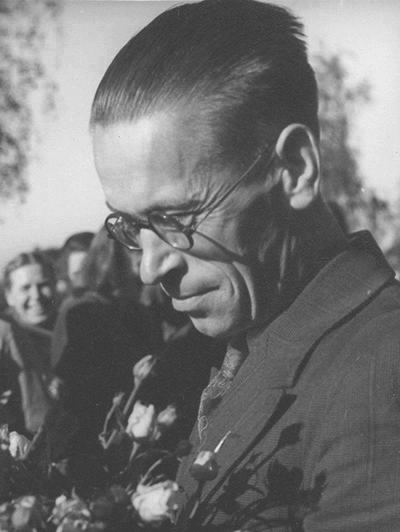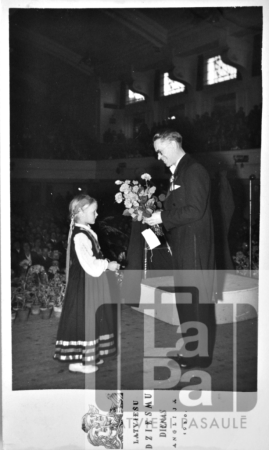Daumants Vītols
1907-1986
Teacher, conductor
Daumants Augusts Vitols (Daumants Augusts Vītols) was born on 20 October 1907 in the primary school of Vitrupe (formerly Kirbizi) parish where his father Fricis Vitols (Fricis Vītols) was the school head and administrator. At the age of six, he began his studies at the school run by his father, and after graduating he studied for a year at the Limbazi State Secondary School. From 1922 to 1926 he studied with the conductor and later conservatoire professor Jekabs Vitolins (Jēkabs Vītoliņš) at the Riga Teachers' Institute. Already in 1925, Vitols led a men’s double quartet at the institute. For the final concert of the school he prepared the song “Sapņu tālumā” (In the Distance of Dreams) by Emils Darzins performed by the 200-voice choir of the institute. He completed his musical education at the Riga First Music Institute where one of his teachers was the composer Janis Ivanovs (Jānis Ivanovs).
In 1926 he was a teacher at the Umurga Primary School in Valmiera County and also led the tradition-rich choir of the Singing Society (Dziedāšanas biedrības koris). After returning from compulsory war service in the Latvian army, from 1929 he worked as a teacher at the Katvari Primary School in Valmiera County. In spring 1934 he married Irma Brunalde, a teacher at the Umurga Agricultural School. In the autumn of the same year, Vitols became a school administrator at the Riga Central Prison. In 1936, invited by the Director of Folk Schools, he accepted a job as a school administrator at the Trikata Primary School in Valka County where he also directed a mixed choir at the Evangelical Lutheran Church. The choir won the 3rd place in rural choir competition at the IX Song Festival in Riga and the Riga Latvian Society Silver Cup. In 1941 Vitols moved to Salacgriva, where he worked in the town school as a caretaker and also directed the Salacgriva Mixed Choir.
In the autumn of 1944, Vitols fled to Germany alone, as his marriage had been dissolved in the summer. He ended up in the Bernsen refugee camp in northern Germany where he began working with a 70-voice mixed choir. In 1946 he was the chief conductor of the 1st Latvian Song Festival in the Elbe region. As the German camps were dismantled, Vitols moved to England in 1947 where he settled in Bradford until 1955. He worked in the textile industry. In 1951, he married Elvira Kalnina (Elvīra Kalniņa), and the couple had sons Andrejs and Janis (Jānis, died in childhood). He founded the mixed choir “Līgo” and a men's double quartet, served as chief conductor at the 1st, 2nd and 4th English Latvian Song Days (London 1949, Leicester 1950 and Manchester 1954).
In 1955, Vitols and his family moved to Montreal, Canada. There he worked in the electricity industry. He founded the men's choir "Junda", which he directed for 25 years, until 1980. He gave concerts in Canada and the USA and took part in song festivals with the choirs. He was also organist at Evangelical Lutheran churches in Liepupe, Bradford, and Montreal.
Vitols has said of himself: ‘I have been associated with loud-throated performances all my life. In the fifth grade of primary school, I started to learn to play the chorales on the school harmonium. I have held the conductor's baton for 55 years.’ And he did indeed do it successfully. His sons continued to follow in their father's footsteps and to nurture the tradition of Latvian choirs. Vitols passed away on 11 November 1986. His ashes lie in the Mount Royal Cemetery in Montreal, next to his prematurely deceased son Janis.
Information sources
Z., Rob. (1997, 1. janvāris). Aizsaulē aizgājušie mūzikas darbinieki. Latvju Mūzika, 26, 3108.-3109. Latvju Mūzika, Nr.26 (01.01.1997) (periodika.lv)
Zuika, R. (1988, 1. janvāris). Cimzes pēcteči. Latvju Mūzika, 18, 1924.-1937. Latvju Mūzika, Nr.18 (01.01.1988) (periodika.lv)








